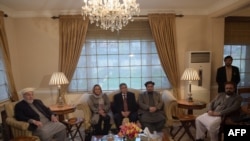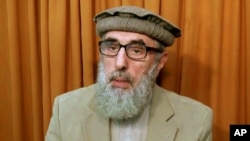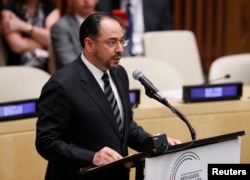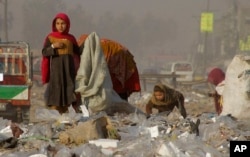War-torn Afghanistan marked International Peace Day Wednesday amid hopes that a widely-anticipated peace deal with a key insurgent group might ease security challenges by encouraging others fighting alongside the Taliban to join the peace process.
Afghan officials have been negotiating for months with Hizb-e-Islami, an insurgent group led by controversial warlord Gulbuddin Hekmatyar. Despite repeated breakdowns, both sides are expected to finalize a draft agreement.
Some opposition to the deal reportedly has been inside the Afghan government. However a statement published earlier this week by President Ashraf Ghani’s governing partner, Chief Executive Abdullah Abdullah, said that he was not opposed to the peace agreement. That move has now set the stage for the government to sign the landmark truce likely to enhance its political credibility inside and outside Afghanistan.
A member of Hekmatyar’s negotiating team, Said Naqibullah Hashmi, while addressing a seminar in Kabul in connection with the International Peace Day disclosed that the peace agreement would be announced “within 24 hours.”
Taliban deal still distant
Despite the reported progress with Hekmatyar, there is widespread skepticism about whether the Taliban is ready to engage in a similar peace effort.
Afghan authorities say they are open to talks with all armed opposition groups but continue to blame neighboring Pakistan’s military and its spy agency for covertly support to the Taliban and its key ally, the Haqqani Network. They suspect Islamabad is trying to retain influence in Afghanistan to halt rival India’s growing influence there.
“We don't expect the violence and terror to subside anytime time soon as the Taliban and affiliate groups are sustained with logistical, financial and material support from elements in Pakistan,” Afghan Foreign Minister Salahuddin Rabbani said Tuesday in Washington while delivering a public talk at the Council on Foreign Relations.
He again alleged that Pakistan's military offensive aimed at uprooting terrorist groups in the country's tribal regions are sparing some groups that launch attacks in Afghanistan. He said instead, the groups are still being helped to prolong hostilities across the border.
“We know that any prospect for the success [of our peace initiative] is strictly contingent on the extent to which the government of Pakistan is willing and ready to clamp down on extremist groups while persuading other groups and individuals ready to renounce violence to engage in direct peace talks,” Rabbani asserted.
But Pakistan vehemently rejects the Afghan allegations as an attempt to divert public attention from multiple challenges facing the Kabul government. Officials point to Pakistan's willingness to host around three million Afghan refugees on Pakistani soil for decades, saying insurgents hide among the refugees and use them as cover for their operations.
Pakistan sees risks in broad anti-militant push
Pakistan’s ambassador to the United Nations, Maleeha Lodhi, told last week’s Security Council meeting on Afghanistan that the international consensus on seeking a negotiated settlement of the Afghan war must be preserved to ensure for long term peace and stability in the strife-torn country.
“A military solution [in Afghanistan] is even more unlikely now. Nor should anyone expect that Pakistan would fight Afghanistan’s war on its soil. Unfortunately, the Afghan parties themselves appear to have moved away from the international consensus that peace can only be achieved through negotiations. Neither side appears willing to talk except on their own terms,” insisted Lodhi.
She reiterated that the NATO-led military operations for nearly 15 years in Afghanistan have not helped end the conflict. She said opening a front against the Afghan Taliban on Pakistani soil could force the insurgents to join hands with the anti-state militants hiding in Afghan border areas, threatening Islamabad’s years of counterterrorism gains.
Mutual counterterrorism allegations and intensified Taliban attacks in Afghanistan are at the center of tensions between Kabul and Islamabad, dampening hopes for cooperation to seek an early revival of peace talks between the Afghan government and the Islamist insurgent group.








